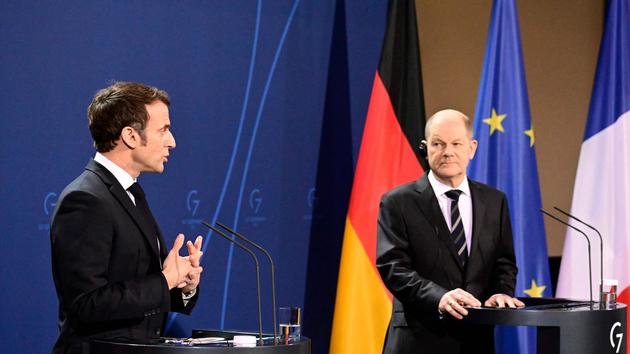Emmanuel Macron and Vladimir Poutine will meet on Friday January 28 by telephone.
While tensions are not easing on the Ukrainian border and the specter of military aggression looms, the Head of State confirmed on Tuesday, during a trip to Berlin, the forthcoming exchange with the Russian President in order to
“to obtain visibility and clarifications”
on the current crisis.
“The situation is not stabilized.
It is worrying for Europe.
It imposes a common reaction”
, he continued.
"A discussion with Russia is always difficult
," he also agreed.
Read also
Ukraine: America and its allies differ on the strategy against Vladimir Putin
He insisted on the need to multiply the channels and to use them
“to the end”
.
He reminded those who deplore European weakness that the dialogue initiated in recent months by the United States had not had any
“concrete results”
either .
Russia is becoming a destabilizing power in the Caucasus, on the fringes of Europe and in a few other regions
Emmanuel Macron
The path to dialogue is not blocked, wants to believe Emmanuel Macron.
"To give up or give up is to acknowledge that the political solution is no longer on the table"
, he warned, when he was also asked about the chances of success of the meeting in "Normandy format" which is to be held on Wednesday between French, German, Russian and Ukrainian advisers.
“We need to talk to each other to break the impasse
,” added German Chancellor Olaf Scholz, who received the French president for a working meeting.
Since January 1, France has assumed the presidency of the European Union and Germany the presidency of the G7.
During their press conference, the Ukrainian crisis made it possible to hide their many points of disagreement.
German hesitations
Despite calls for dialogue and de-escalation, the two leaders could not hide their concern.
"Russia is becoming a power of destabilization in the Caucasus, on the borders of Europe and in a few other regions"
, continued Emmanuel Macron, citing the hybrid maneuvers attributed to Russia in the cyber field (Ukraine was the victim of a vast attack last week) or in the manipulation of migratory flows (in reference to the Belarusian crisis).
Russian aggression against Ukraine would have
"serious consequences"
and a
"very high" price
, repeated Olaf Scholz without giving further details.
Read also
Ukraine: “Europeans must prepare for the consequences of a possible Russian offensive”
If the French president and the German chancellor have tried to show their unity against Moscow, Paris and Berlin are not adopting exactly the same strategy.
Faced with rising tensions, Germany plays a cacophonous score that strongly displeases its allies.
The chief of staff of the German navy Kay-Achim Schönbach had to resign this weekend for having described
as “inept”
the hypothesis of a Russian invasion and considered that the Russian president, Vladimir Putin, deserved of
“respect”
.
The episode illustrates the German hesitations.
The differences in sensitivity cross the coalition made up of the Social Democrats, the Greens and the Liberals.
German reservations about military intervention
The Nord Stream 2 gas pipeline project, which should make it possible to supply Germany with gas from Russia, is at the center of the dispute: the SPD, as before the conservatives of the CDU, would have liked to dissociate the file, economic according to them, strategic issues.
Olaf Scholz, under pressure from his international partners, corrected the situation by conceding that the project could be suspended in the event of a Russian attack.
Inhibited by its history, Germany is more than reserved when it comes to military intervention.
Facing Russia, it is also hampered by the economic consequences of an open crisis.
They would weigh more heavily on Germany than on others.
Read also
“What is happening now in Ukraine is crucial and will have consequences for decades to come”
But the procrastination does not stop there.
Germany has blocked arms exports decided by Estonia to Ukraine in the name of its restrictive legislation.
The Greens, mainly, do not want to participate in the logic
of "escalation"
in the region.
On the other hand, Germany agreed to deliver a field hospital to Ukraine.
Tuesday evening, Olaf Scholz did not change his position by recalling the refusal of the German government to deliver lethal weapons.
"But we have done a lot for Ukraine's economic development
," he added.

